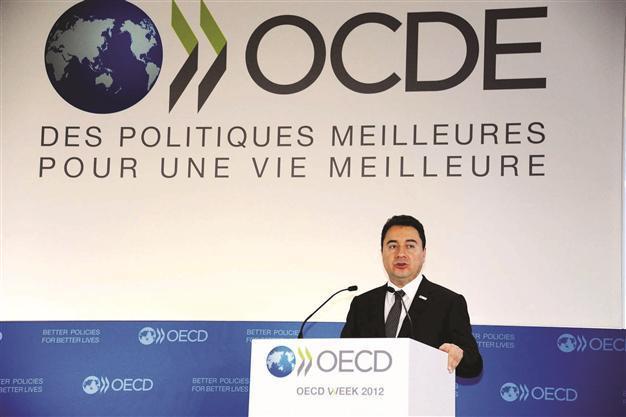Turkey assumes OECD presidency
PARIS - Hürriyet Daily News

The economic downturn caused severe damage to the global economy, scaling down economic activity and forcing banks and countries to default, Ali Babacan says. AA photo
turkey’s Deputy Prime Minister Ali Babacan said yesterday the Organization for Economic Cooperation and Development (
OECD) played an important role in devising policies on a global scale to remedy damage from the global economic crisis, as he chaired the OECD Ministerial Council meeting in Paris.
Turkey has assumed the group’s rotating
presidency in 2012, marking the first time Turkey has chaired the council in 26 years.
“The biggest challenge ahead is to introduce policies which will serve both national and global interests as well as economic and social demands. And OECD is a major platform to define such policies,” Babacan said, speaking at the opening of the OECD Ministerial Council meeting, according to Anatolia news agency.
New approaches to emerging from economic crises, the free-trade system and employment-based growth, investments in employment, development strategy, gender equality, skills and education, skills strategy and cooperation with strategic regions — particularly in North Africa and the Middle East — are main topics of the meeting.
The global economy faces multifaceted problems, which Babacan said make it difficult to reach consensus and make joint decisions, adding that the global economy needs to create 21 million new jobs each year until 2015 in order to return to pre-crisis levels of employment. He said the economic downturn caused severe damage to the global economy, downscaling economic activity and forcing banks and countries to default, as well as causing major volatility in stock markets. He warned against additional problems in national debt due to over-borrowing, which poses a serious threat given lower levels of saving.
One of the founders of OECD, Turkey is among the countries making an active contribution to the organization.
Growth forecast
Speaking on a television channel yesterday Babacan said the government stands by its forecast of 4 percent growth this year, adding that the government will revise the figure if necessary. Turkey’s economy is doing better than those of other developing countries, Babacan said, adding that the Turkish economy is on solid ground. Turkey has a sound banking system and does not have any problems regarding its national budget, he said.
Turkey’s role in the world economy will increase as the country’s partner economic growth will be slow, said Fatih Birol, the chief economist at the International Energy Agency, the energy watchdog of the developed Western countries. This will enhance the political weight of the country, he added.
“We expect Turkey to lead the OECD countries in economic growth in the upcoming period,” Birol said, speaking at the OECD Forum. “If there is not a deep recession in Europe this year, oil prices will be around $100 [per barrel]. This is bad news for oil-importing countries,” he said, adding that high oil prices are one of the biggest reasons behind Turkey’s current large account deficit.
The Turkish Confederation of Employers’ Unions (TİSK) hosted the OECD Forum’s 2012 gala dinner together with the Business and Industry Advisory Committee (BIAC), marking the 50th anniversary of the OECD, according to Doğan news agency.
Among the high-profile guests in attendance from all sectors of the global business community were Hürriyet Executive Board Chairman Vuslat Doğan Sabancı, Turkey Sugar Plants General Manager Mehmet Azmi Aksu, İşbank Chairman Ersin Özince, Fiba Holding Board Member Murat Özyeğin. Hürriyet is a media partner for the OCED Forum 2012. BIAC General Secretary Tadahiro Asami, TİSK President Tuğrul Kutadgobilik, and OECD General Secretary Angel Gurria were also in attendance at the dinner.
